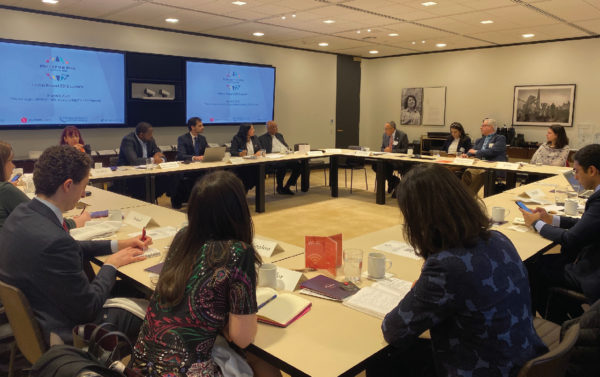Southern Voice on Post-MDG International Development Goals pursues a rich research portfolio related to the 2030 Agenda for Sustainable Development,…
Southern Voice launched the Global Report of its flagship initiative “State of the Sustainable Development Goals” (SVSS) in New York on March 3 & 4, 2020.
SVSS is an empirical research initiative that stands out for being conceptually innovative and policy-relevant, with a unique Global South perspective.
A group of approximately 70 policymakers, diplomats and distinguished guests was presented with the findings during two lunch events, co-organized with the United Nations Foundation.
The first event (March 3), “Key synergies among Goals: accelerating the 2030 Agenda”, was opened with welcome remarks by Sofia Borges (Senior Vice President, UN Foundation) and Dr Debapriya Bhattacharya (Chair, Southern Voice). “Today is a very special day for us. It’s the end of a two-year intellectual journey. Twelve think tanks and over fifty researchers from the Global South worked on this one-of-a-kind report”, said Dr Bhattacharya.
 The panel session was led by SVSS researchers Jose Florito – CIPPEC (Argentina) and Chukwuka Onyekwena – CSEA (Nigeria). Mr Florito talked about how a lack of thorough understanding of the interactions between SDGs (and their targets) has prevented many countries from maximising synergies and minimising trade-offs. This has delayed progress on the achievement of the 2030 Agenda. “Take early childhood education and care services as a good example. Evidence from multiple disciplines shows how expanding the reach of these services can have rippling effects throughout the SDG network,” he said. Concrete examples on this can be found in the case study from Nigeria. “The key untapped synergy in Nigeria is the impact of educating women. Sociocultural practices in the North, which lead to a lack of enrollment of females in schools, are a major driver of the North-South gap in educational attainment,” explained Dr Onyekwena.
The panel session was led by SVSS researchers Jose Florito – CIPPEC (Argentina) and Chukwuka Onyekwena – CSEA (Nigeria). Mr Florito talked about how a lack of thorough understanding of the interactions between SDGs (and their targets) has prevented many countries from maximising synergies and minimising trade-offs. This has delayed progress on the achievement of the 2030 Agenda. “Take early childhood education and care services as a good example. Evidence from multiple disciplines shows how expanding the reach of these services can have rippling effects throughout the SDG network,” he said. Concrete examples on this can be found in the case study from Nigeria. “The key untapped synergy in Nigeria is the impact of educating women. Sociocultural practices in the North, which lead to a lack of enrollment of females in schools, are a major driver of the North-South gap in educational attainment,” explained Dr Onyekwena.
Respondents of this session were Irena Zubcevic from UN DESA and Kate Richards, from the Global Partnership for Sustainable Development Data. The session was moderated by Kavita Desai from the UN Foundation.
The second session (March 4), “Engaging the global community: addressing the impact of global challenges”, was led by SVSS researchers Vaqar Ahmed – SDPI (Pakistan) and Karin Fernando – CEPA (Sri Lanka). Panellists discussed important questions for the global community, such as how to react to global trends (e.g. automation). To exemplify this, they looked at a case study from Sri Lanka and the impact of automation on its apparel sector.
“Every country on its own needs to have a better understanding of the transmission mechanisms of global systemic issues [to national settings], so that better policy responses can be designed”, Dr Ahmed said, referring to the impact global issues can have on a national level.
Addressing an issue that was raised in the session the day before, during the conversation on synergies and trade-offs between SDGs, Ms Fernando added: “Lack of daycare and housing prevents women from accessing or staying in a job”. Respondent was H.E. Mrs. Janine Elizabeth Coye-Felson, Ambassador, Deputy Permanent Representative, Permanent Mission of Belize to the United Nations. This event was moderated by Jimena Leiva Roesch, International Peace Institute.
The conceptual and empirical analysis of the Global Report focuses on three layers of critical action to achieve the SDGs. You can access them here:
“A cross-country synthesis of Leave No One Behind”, by Ibrahima Hathie (IPAR, Senegal)
“Leveraging synergies and tackling trade-offs among specific goals” by Gala Diaz Langou, Jose Florito, Alejandro Biondi, Florencia Caro Sachetti, Luciana Petrone (CIPPEC, Argentina)
“Addressing Global Systemic Concerns while Implementing SDGs at Country Level” by Shehryar Khan Toru, Vaqar Ahmed (SDPI, Pakistan)
Southern Voice’s “Global State of the SDGs Report” also offers evidence-based policy responses to address current challenges the 2030 Agenda faces. It looks at the decade ahead and at how to strengthen societies’ collective capabilities. All the lessons learnt from this research can be used to improve and accelerate SDG implementation. Read more about it in the chapter:
“State of the SDGs”: a focus on four closely interconnected collective capabilities” by Marcela Morales, Estefania Charvet, Andrea Ordoñez
For more information on the initiative, visit the SVSS microsite. You will not only find the Global Report 2019, but also the regional reports on SDG progress in Africa, Asia and Latin America. We also present country case studies, namely from Bolivia, Ghana, India, Nigeria, Peru, and Sri Lanka, that exemplify the implementation of SDG 4 (quality education), SDG 7 (affordable and clean energy) and SDG 8 (decent work and economic growth). And don’t miss our booklet with infographics and a printable poster summarising our findings.
Being together in NY enabled the first convening to lay the foundation for the second iteration of the “State of the SDGs” initiative. We look forward to sharing more with you and also hearing from you! Ideas, approaches and possible collaborations are welcome. Please reach out to Andrea Ordóñez (andrea@southernvoice.org) with your suggestions.
To keep up to date, follow our channels and re-publish the material as you please: Twitter, Facebook and LinkedIn.


